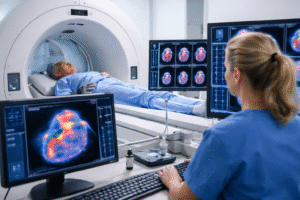Diseases of the Mitral Valve
The mitral valve is one of the four valves found in the human heart. It is located between the left atrium and the left ventricle. Like all heart valves, the mitral valve helps regulate the flow of blood through the heart; specifically, from the left atrium to the left ventricle. Whenever the heart contracts, the mitral valve seals itself off to stop blood from flowing into the lungs. A diseased or damaged mitral valve cannot function and should be surgically repaired or replaced by a cardiologist in Tampa.
Those suffering from a condition involving the mitral valve can get progressively worse over time if left untreated. Mitral valve diseases, such as mitral valve regurgitation and mitral valve stenosis, can be debilitating on their own, but they also open the door for other conditions, such as heart dilation and atrial fibrillation. If you are experiencing symptoms such as shortness of breath, chest pain, dizziness, fatigue, swollen ankles or legs, persistent coughing, or heart palpitations, consult a cardiologist in Tampa, FL, from Ascent Cardiology Group to see if you are suffering from one of the diseases of the mitral valve.
Those suffering from a condition involving the mitral valve can get progressively worse over time if left untreated. Mitral valve diseases, such as mitral valve regurgitation and mitral valve stenosis, can be debilitating on their own, but they also open the door for other conditions, such as heart dilation and atrial fibrillation. If you are experiencing symptoms such as shortness of breath, chest pain, dizziness, fatigue, swollen ankles or legs, persistent coughing, or heart palpitations, consult a cardiologist in Tampa, FL, from Ascent Cardiology Group to see if you are suffering from one of the diseases of the mitral valve.
Mitral Valve Prolapse and Regurgitation
If the leaflets of the mitral valve bulge, or prolapse, it can cause issues during heart contractions, such as mitral valve regurgitation. Mitral valve regurgitation occurs when a prolapsed mitral valve allows blood to leak into the atrium from the ventricle. Although mitral valve prolapse isn’t especially harmful, and most people don’t realize that they have it, in some cases, treatment is required. This condition is most commonly caused by myxomatous valve disease, which is when the valve leaflets are too stretchy.
Approximately two percent of the population suffers from mitral valve prolapse. Generally, this disease is passed down through genetics, but it can also be caused by health problems, like connective tissue diseases. Detecting mitral valve prolapse without the assistance of a cardiologist in Tampa can be difficult. Your cardiologist can listen to your heartbeat with a stethoscope to detect a murmur that may be indicative of mitral valve prolapse. Other symptoms include heart palpitations, chest pain, and fatigue.
Approximately two percent of the population suffers from mitral valve prolapse. Generally, this disease is passed down through genetics, but it can also be caused by health problems, like connective tissue diseases. Detecting mitral valve prolapse without the assistance of a cardiologist in Tampa can be difficult. Your cardiologist can listen to your heartbeat with a stethoscope to detect a murmur that may be indicative of mitral valve prolapse. Other symptoms include heart palpitations, chest pain, and fatigue.
Mitral Valve Stenosis
Unlike mitral valve prolapse, which occurs when the valve leaflets of the mitral valve are too stretchy, mitral valve stenosis occurs when these leaflets become too thick or stiff. When this happens, the leaflets can fuse together, resulting in a narrowed valve opening that constricts blood flow from the left atrium to the left ventricle, causing fatigue, shortness of breath, swelling, and more. Individuals suffering from this condition must consult a cardiologist in Tampa, FL, to determine whether the condition has progressed to the point where surgery will be required. If your condition becomes worse, your cardiologist can repair or replace the mitral valve utilizing a minimally invasive surgical option.
To consult a cardiologist in Tampa, FL, from Ascent Cardiology Group, please request an appointment today.
Disclaimer: The contents of this website are for general educational purposes only. All content and media on the Ascent Cardiology Group website does not constitute professional medical advice nor is the information intended to replace the services of Ascent Cardiology Group or other qualified medical professionals. If you believe you are having a medical emergency, call 911 immediately.
The content, views, and opinions communicated on this website do not represent the views of Ascent Cardiology Group. Reliance on any information provided by this website is solely at your own risk. Although this website contains links to other medical websites, this is strictly for informational purposes. Ascent Cardiology Group is not responsible nor do they approve of the content featured on any third party linked websites referenced on this website.
The content, views, and opinions communicated on this website do not represent the views of Ascent Cardiology Group. Reliance on any information provided by this website is solely at your own risk. Although this website contains links to other medical websites, this is strictly for informational purposes. Ascent Cardiology Group is not responsible nor do they approve of the content featured on any third party linked websites referenced on this website.
More Resources

How High Blood Pressure Affects Your Heart, Brain, and Body
High blood pressure—also known as hypertension—is one of the most common and dangerous cardiovascular conditions worldwide. Often called the “silent

Stress and Heart Disease: How to Protect and Improve Your Heart Health
Chronic stress is increasingly recognized as a major risk factor for cardiovascular disease. Many high-performing, Type A individuals juggle demanding

What Is Nuclear Cardiology? Tests, Benefits, and What Patients Should Know
Nuclear cardiology is a specialized field of cardiovascular medicine that uses safe, low-dose radioactive tracers combined with advanced imaging technology